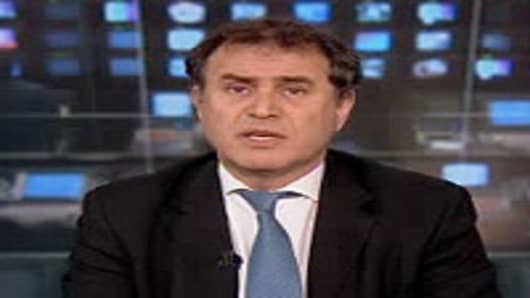Most investors follow the same strategy of borrowing in dollars and investing in assets across the world, and there may be a crash in global assets when the greenback's downward trend reverses, Nouriel Roubini, Chairman, RGE Monitor, told CNBC Monday.
"There is a wall of liquidity…chasing assets," Roubini told "Squawk Box."
"Now we are in the mother of all carry trades," he added.
Asset prices have been inflated by the cheap funds but the dollar cannot keep falling forever, and there could be "a market crash all over the world" when the currency's course is reversed.
But this will not happen too soon as the real economy is still very weak and the Federal Reserve is likely to keep interest rates close to 0 percent for longer, Roubini added.
"The reality is that the dollar is the funding currency of the carry trades. Because of that the dollar weakness is going to continue for a while."
He reiterated his view that the recovery is likely to be anaemic, forecasting growth of between 1 percent and 2 percent for the US in the next two years compared with the country's potential for 3 percent annual growth.
Japan and Europe are likely to grow by less than 1 percent, he said.
"The (stock) markets are pricing in a V-shaped recovery," Roubini said. "If the data surprise on the downside then there is going to be a significant correction."
The price of oil may also be among the assets that will fall.
"It seems to me that this rally in oil prices is way ahead of the economy," Roubini said.
More Trouble for Banks
More losses may be ahead for banks, as the residential property sector fell 30 percent and the commercial property sector is 40 percent down in the crisis, he added.
These losses have yet to be recognized both by big financial institutions and by regional banks, according to Roubini.
"Once they are recognised they will be additional losses for the banking system," he said.
Breaking up banks to avoid systemic risk when they fail may be the correct way to deal with the problem of the economy's vulnerability in relation to the financial sector.
"Why don't we go to a system where they're not too big to fail to begin with?"
Now the problem of banks being too big to fail "is even bigger than before and we've done nothing to resolve it," Roubini said, listing the wave of bank mergers caused by the financial crisis.
Room for Monetary Policy Mistake
The price of gold may continue rising but it is not likely to hit $1,500 as gold bulls predict, he said.
There are only two scenarios in which gold would hit that price, one would be world inflation, which is not likely to happen in next 2 years, and the other the risk of a near depression, which has been averted, Roubini said.
He said he was still worried about the possibility of monetary policy mistakes.
"I think there is room for a policy mistake because damned if you do, damned if you don't."
"It's a very narrow path… to lead us out of this mess without making a policy mistake. And I worry about policy mistakes."


